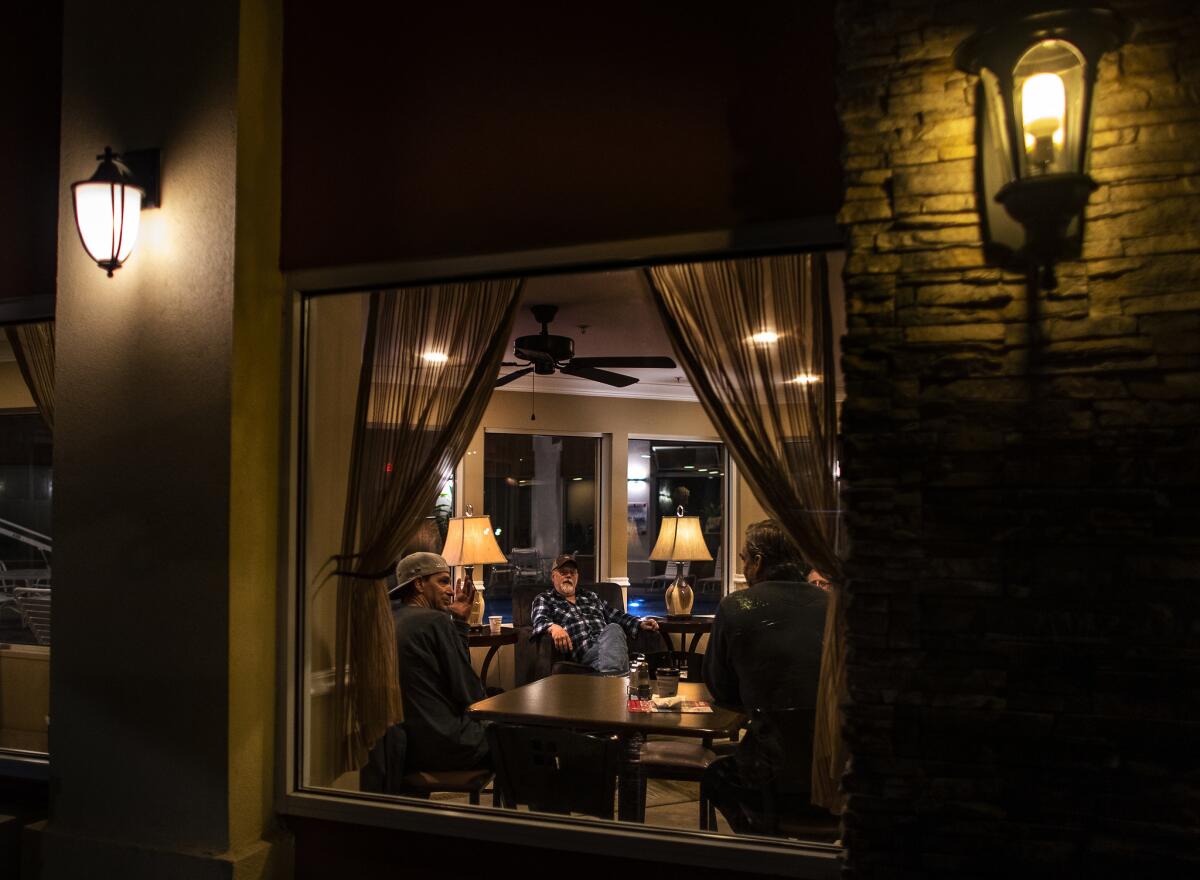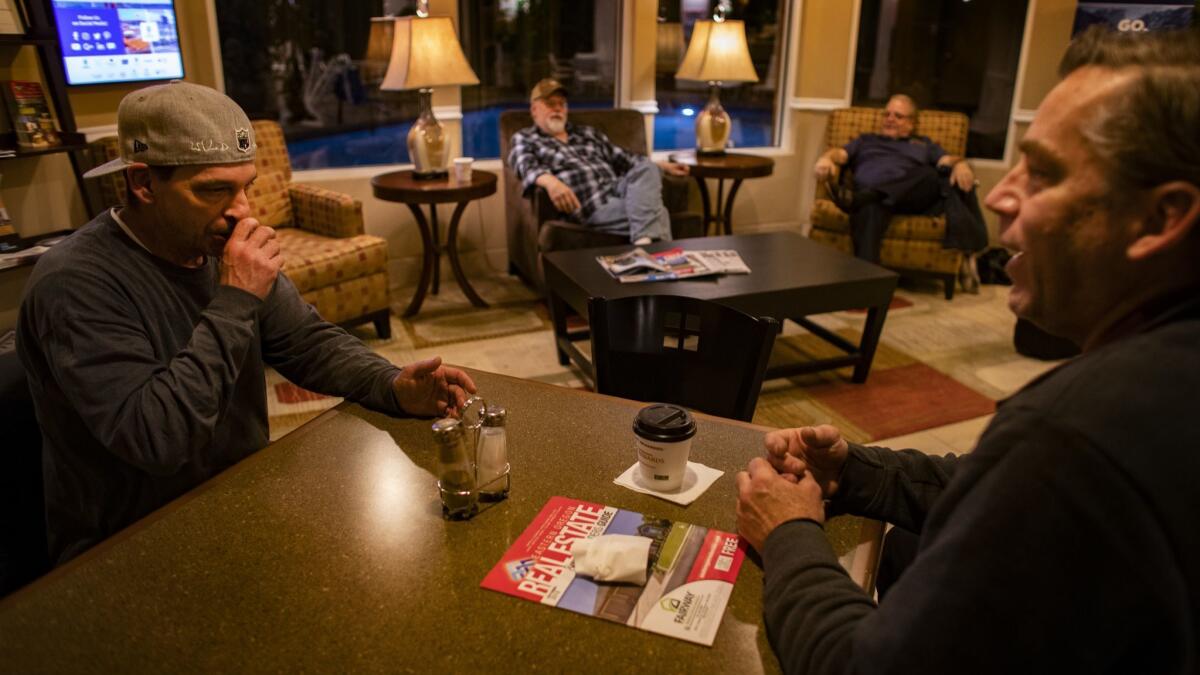Strangers from Paradise find solace amid the horror and uncertainty in a far-away hotel

- Share via
Reporting from CORNING, Calif. — In a hotel about 40 miles from Paradise, Bill Krulder and other refugees of the worst fire in California history wait for when they can return to what’s left of the town.
Krulder sat in the lobby Tuesday with his back to the window. Outside, a steady, light rain pelted the ground.
“It’s a little too late,” he said.
“Way too late,” added Joe Sievers, 67, another Paradise resident who found his way to the hotel.
Residents in this Central Valley community have come to expect rainstorms in October, just as the leaves of the bountiful trees explode in deep burgundy, yellow and orange. They wondered out loud whether the rain showers, if they had arrived on time, would have prevented the deadliest fire in modern California history from ripping through Paradise.
Now that the damage is done, they said, the rain is adding another roadblock in their quest to return to some sense of normality.
The rain, which helped in last week’s containment of the wildfire, is now keeping Krulder from returning to what’s left of his home.
He had a hazy picture of his mobile home, with smoke rising from nearby debris. The house is still standing — most in his mobile community aren’t — but it looks damaged. He’s worried rainwater will turn the ash into sludge and make it difficult to comb through the wreckage.
“It’s stopping us from going up there,” Krulder said. “It’s delaying … FEMA going up there. Right now, it’s a waiting game for everybody.”
LIVE UPDATES: The latest on the California wildfires »

Over the last few weeks, Krulder and Sievers have made the Best Western hotel home. The two men didn’t know each other before the fire, though they lived in the same small town for years and frequented the same haunts.
They didn’t know 53-year-old Valarie Susnow of Magalia or 56-year-old Brian Boyd of Paradise, who joined them in the lobby Tuesday.
But since the Camp fire, they have formed a little community around the waffle maker during breakfast, passing one another in the elevator and lounging in the lobby, where Krulder and Sievers said in unison that they sit to “worry.”
Around the table, they trade escape stories of dodging embers and feelings of guilt. Together, they try to make sense of the tragedy that unites them.
They are among thousands of Paradise residents who fled their homes the day the fire started and have not been allowed to go back since. There is growing frustration at the pace of getting people back to see what is left of their properties as well as longer-term shelter plans for those who lost their homes.
The first of three storm systems expected in the area dropped a smattering of rain Tuesday. Forecasters predicted about an inch of precipitation, saying the relatively weak system would sputter out by early Wednesday.
But a stronger storm will roll in late Wednesday, bringing with it the potential for debris flows and up to 3 inches of rain through Thursday night.
The Butte County Emergency Operations Center has prepared for the rain by clearing drainage culverts of debris, said Matt Gates, public information officer for the Paradise Police Department.
The California Conservation Corps also has been working on erosion-control measures for mountain slopes filled with fire-damaged pine and chaparral.
“Ash doesn’t absorb water, which complicates things,” Gates said.
PG&E offers state little explanation about why it didn’t shut off power before Paradise wildfire »
A third storm could bring 2½ to 4 inches of rain to the charred region from Friday through Sunday.
“It’s the intensity that can cause debris flows,” said Eric Kurth, a meteorologist with the National Weather Service. “If the rain comes over time, there’s some opportunity for it to absorb or gradually run off. When we have rapid runoff, that’s when it can bring down entire hillsides.”
The soil in recently burned areas cannot absorb significant amounts of rainwater, so excessive precipitation can lead to fast-moving flows containing mud, debris and even trees and boulders. The devastation can be deadly and often comes without warning.
The rain is also expected to complicate the already challenging search for human remains among the rubble of the Camp fire.
Typically, crews scoop fire debris into a screen and sift it, looking for bone or bone fragments, but the ash and rain have mixed to form a clay-like substance, making the task nearly impossible. Officials have had to bring in water and gently wash away the clay to expose potential human remains in the charred mess.
Authorities are slowly narrowing the list of the missing, which on Monday night stood at 158, down from nearly 1,000 last week. Officials have found the remains of 88 people.
For Paradise survivors, the scale of the loss remains impossible to imagine. Many spent years building homes and lives there. But with much of town — including more than 1,400 homes — burned, some are not sure what they return to.
Sievers said in the 41 years he lived in Paradise, he had turned his home into an oasis in the mountains. He created a mechanic’s shop where he fixed Subarus and sold them at cost to people living on little.
“They call me ‘Subaru Joe,’ ” he said with a chuckle.
He had rows of crops and fruit trees in his backyard.
Two years ago, plentiful rains helped him yield 300 pounds of cherries, most of which he donated. This year, dry conditions and a late rain washed away the blossoms and he grew only 50 pounds.
The fire took it all: his house, the cars he was fixing up, his harvest.
“Every square inch of that place had my fingerprints on it,” he said.
Sitting in the plush lobby chair, Sievers choked back emotion while describing his former life. He said he hasn’t allowed himself to break down.
He’s thankful for the rain, finally coming to purify the air. And he’s grateful for the respite it will give him in trying to sift through the life he lost.
Times staff writers Rong-Gong Lin II and Cindy Chang in Paradise, and Hannah Fry and Matt Hamilton in Los Angeles contributed to this report.
More to Read
Sign up for Essential California
The most important California stories and recommendations in your inbox every morning.
You may occasionally receive promotional content from the Los Angeles Times.














